Contour GPS HD Video Camera Review
There are lots of reasons to like the Contour HD series video cameras — size, weight, durability, ease of use and superb video and more.
The Contour GPS with Bluetooth on board made further resistance futile on my part; I have been assimilated, and gladly.
In an effort to make a web Editor’s job even more challenging, the company previously known as Twenty20, who made the VholdR Contour video cameras we have reviewed previously, has changed its name once again.
It is now known solely as “Contour” (Contour, Inc.) but you may still see this one referred to as the VholdR Contour GPS HD video camera. Go figure.
Contour GPS Overview
webBikeWorld has reviewed the Contour HD video camera product line in detail.
The previous webBikeWorld reviews include both the VholdR ContourHD Video Camera (review)and the earlier VholdR Helmet Camcorder (review), which covered the ground in some detail from out-of-the-box impressions to on-road samples.
Call them what you will, the Contour HD video cameras continue to evolve and if my research is valid, they have also gained significant market share.
I see the GoPro HD (review) video camera as the main competition to the Contour HD and we all gain here; each product has its own distinct features and unique capabilities for consumers to exploit.
So my focus here (pun intended) is to spend more time looking at the Contour GPS HD video camera.
It is a recent member in the ever-growing family of Contour HD videocams (the $500.00 Contour+ has now been announced and we’ll be reviewing it also).
Like its other siblings, the Contour GPS is a well-made small form-factor video camera, now with still photo capabilities, that sets the standard in so many categories.
But what really makes the difference with this model is indicated by the “GPS” moniker attached to its name. The Contour GPS also has a few different internal components.
With its integrated GPS receiver, this video camera is able to track location, speed and altitude (not attitude), all the while capturing your motion in full HD.
In addition, playback using the provided “Storyteller” application and linked Contour interactive map display enables the owner to visualize and graphically track all the action.
Just remember that playback, processing and storage requirements vary depending on video quality, frame rate and the size of the file.
As noted by many, including Burn during the 1080/720p review, what should work and what will work are often separated by a wide margin.
Patience, along with good processing power and a surplus of memory is (often) needed…
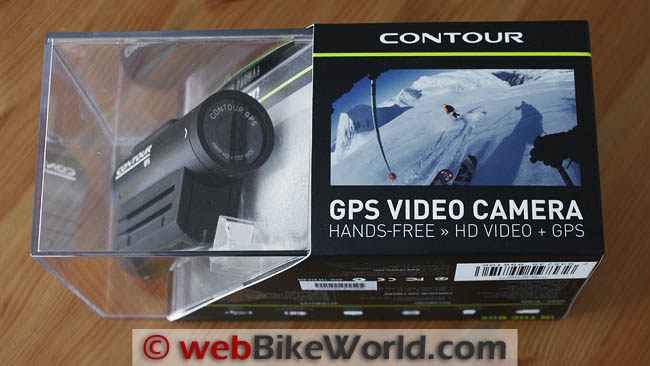
Where to Buy Contour GPS
Check Reviews & Prices on Amazon Check Reviews & Prices On RevZillaSee More: Motorcycle GPS, Motorcycle Intercom, Motorcycle Accessories
Primary Features of the Contour GPS
The functionality of the new Contour GPS HD videocam is nearly identical to the VholdR ContourHD Video Camera reviewed by Burn so you may want to read that article to familiarize yourself with the operation of the unit.
The Contour GPS version of the video camera has gained a few grams in acquiring GPS, among other things; a worthwhile trade-off from my perspective.
There isn’t much to initially differentiate it from the standard HD model other than the fatter “Record” switch that houses the GPS receiver, along with an extra memory card slot on the new model, visible when the door is open.
Camera Settings
There are some slight differences between the original VholdR ContourHD and the Contour GPS HD models regarding resolutions and frame rates; for example, the GPS model also adds a still photo mode.
The Contour GPS HD video camera specifications include:
- Full HD 1080p, 1920 x 1080 @ 30 fps – The highest resolution available.
- “Tall” HD 960p, 1280 x 960 @ 30fps – For recording action that may be better suited to a taller image.
- “Action” HD 720p, 1280 x 720 @ 60 fps – Provides a faster frame rate with lower resolution for fast action; it can also help reduce blur and the CMOS rolling shutter effect.
- Contour 720p, 1280 x 720 @ 30 fps – Provides smaller files for longer recordings.
- Still Camera, 2592 x 1944, six shutter speed rates (1, 2, 5, 10 , 30 and 60 seconds) for single or sequence freeze-frame capture.
While all three models of the Contour video cameras are becoming more standardized, GPS (using the NMEA 0183 Data Specification), Bluetooth and Connect View capabilities are unique to the Contour GPS and Contour+ models.
The Contour+ also gets a 170 degree field of view vs. 135 for the HD and GPS models.
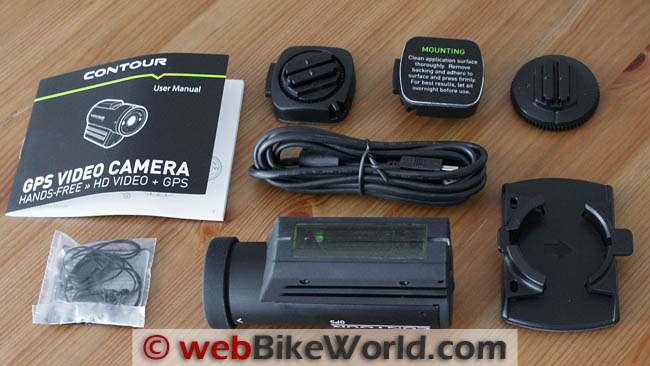
Key Component: The Contour Storyteller Application
The new Contour Storyteller application provides the means to transfer, playback, edit and upload videos from the Contour GPS HD.
But while other video applications can be used to play back and edit the default Quicktime .MOV files (H.264/MPEG-4), Storyteller provides an integrated environment between the recording device and the processing/playback device — an environment crucial for ContourGPS users.
As a relative newcomer to the Contour world, I missed the original application that Storyteller replaced, but there seems to have been or is some rocky history regarding the Contour application and uses.
That said, for my part, I have seen constant improvement over the last six months particularly, with many enhancements specifically focused on allowing users to fully exploit the unique video and track data captured by the Contour GPS camera.
In its current iteration, Storyteller provides a relatively effortless means to display video and location data together into a single interactive session, all controlled by the user.
With the on-board GPS receiver activated (initially via the “Configure Camera” under Storyteller), the unit records its usual superb HD video, but additionally, precise location, speed and altitude data, to a separate file (GPS-log.txt).
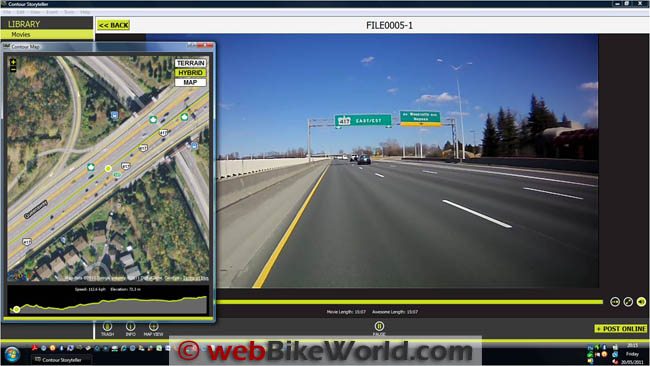
File Playback and the Power of the Contour GPS
With Storyteller loaded and a connection to the Internet, viewers are treated to interactive video and Contour map (powered by Google) playback screens.
As the video runs, the interactive “Contour Map” display, toggled by the “Map View” button in the lower left corner of the base pane of the video window, uses the separate recorded GPS data to dynamically populate a rolling map display.
This is something that will be familiar to most Google or Google Earth users.
The lower section of the map view screen provides readouts of speed and altitude. If alternate views are desired the usual Google “Terrain”, “Hybrid” and “Map” view toggles are available in the upper right of the Contour Map window.
Outside of making sure the file is downloaded and played back under Storyteller, there isn’t much more to do initially.
The interactive map display and video player are synchronized, so when rewind, fast forward or other functions are used the map display does the same, with virtually no lag.
Once again, a reminder that like anything else being streamed and processed, computer abilities and connection speeds may impact overall playback flow.
I have a high-powered multi-processor desktop with loads of fast memory running Microsoft Windows 7, but my aging Sony AW-110D large screen laptop, designed for multimedia work and running Vista keeps pace with the desktop.
My road warrior Gateway notebook copes quite well also although like so many systems, playing back .MOV files is not seamless.
It pays to explore everything Storyteller has — it includes a host of GPS-related features, including the ability to export recorded GPS data in text, CSV or GPX format.
It can also switch between imperial or metric units of measurement when viewing GPS data and, synchronize camera time to the computer.
So far I’ve managed to export GPS log file data into all three formats, and subsequently use all three formats for viewing or loading into other programs, including Google Earth and Google maps.
Only Garmin MapSource is being a bit cranky about loading the GPX format file…more playing needed obviously.
On a related note, exporting the GPS data and subsequently loading it into Google Earth, Google Maps or other compatible applications is possible.
This then provides the ability to save the trip (original or edited) to a “Keyhole Markup Language” or KML format (XML grammar) file, providing another widely recognized means to share/exchange data.
Minimum system requirements for Storyteller are: Microsoft Windows XP SP 2 and QuickTime 7; and, Mac OS 10.5 or greater and QuickTime 7 or greater.
As with other Contour products, users can review, edit and upload video at the Contour website for viewing and sharing.
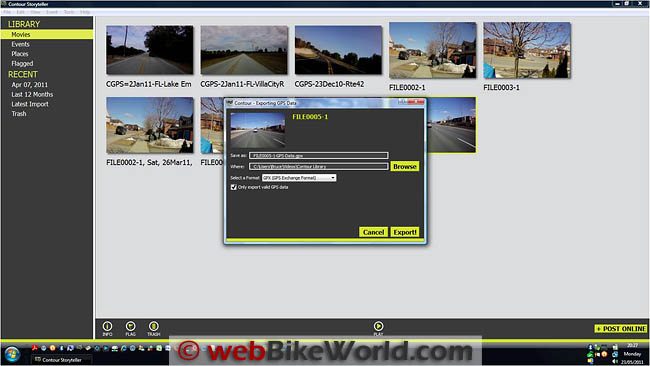
Where to Buy Contour GPS
Check Reviews & Prices on Amazon Check Reviews & Prices On RevZillaSee More: Motorcycle GPS, Motorcycle Intercom, Motorcycle Accessories
The Contour Camera Mobile App
In addition to now having the ability to record the “Where” with precision, users can also now have the “What” — the ability to view exactly what the camera is seeing with a live view.
Contour was tantalizing owners and potential owners for months with the prospect of adding a live preview feature to the camera.
This would be similar to the live view capability that the GoPro LCD BacPac (review) provides for the GoPro HD models.
But from my perspective Contour upped the live view ante by a factor of at least one.
How?
By implementing a wireless Bluetooth version 2.1+ EDR link capability to provide video streaming from the camera along with an interactive data interface capability for configuring the camera on the fly.
Support for the Apple iPhone 4, iPhone 3G, iPhone 3GS and 3G/4G iPod Touch devices was released first. Android-based devices will soon be empowered as well: interested owners can sign up on the Contour site to receive a release advisory email.
This live viewfinder feature is the major reason why Bluetooth (surprise!) has been quietly resident inside the Contour GPS model since it was released.
With this capability unleashed by way of a small form factor Connect View card that nestles beside the battery, and the Contour Mobile App installed on a compatible iOS device, the stage is set.
An email advisory from Contour support let me know that the Contour Apple iOS App had been posted, available as a freebie from the Apple Store (search on “Contour”). Ten minutes later the application was downloaded and installed on my 3rd Gen 32GB iPod.
The only thing now needed was the Connect View card needed for the iOS connection.
After being told by one vendor that the card would not be available for two to three weeks (frown), a quick email exchange with Contour Support verified that the cards were available from select resellers.
While on the ordering kick, a Contour 3100 Universal Mount Adaptor that provides a standard 1/4-20 tripod mount capability that most of us, including Burn, think should be included with the camera kit was added.
A medium-sized Otter Box for stashing, protecting and locking-up the small portable digital video gear while on the go rounded out the order.
During the seven-day wait for the order (another frown), I updated the camera firmware to version 1.12 and the Storyteller PC application to version 3.0.6.
The instructions for installing and configuring the new capability were clear; Contour does a good job of describing what needs to be done and identifying potential issues.
By updating Storyteller to version 1.12 (or later) and with the camera connected via its USB interface, this and later versions of the application initiates a critical online process that looks up the valid ID for your Bluetooth-enabled Contour GPS unit.
This small file is then downloaded to your computer.
Once received, the ID file is loaded under the root directory of the SD card, titled “bt.adr”.
If Storyteller cannot be run or a live connection isn’t possible, one should contact Contour Support for assistance in getting the necessary Bluetooth ID; without it, not much is going to happen.
Evaluation Configurations for the Contour GPS HD
Initial Evaluation Baseline:
- ContourGPS Firmware Version 1.12
- Storyteller PC Application Version 3.0.6
- Contour Camera Live View Application Version 1.4
- iPod Software Version 4.3.1
Final Evaluation Baseline:
- ContourGPS Firmware Version 1.13 (6 May 2011) and Version 1.15 (19 May 2011)
- Storyteller PC Application Version 3.0.8
- Contour Camera Live View App for iOS Version 1.4 (28 March 2011)
- iPod Software Version 4.3.3
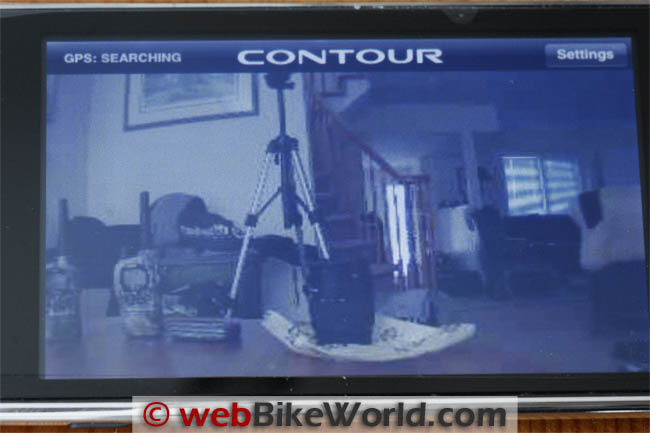
Installation and Initial Mobile App Configuration
Finally — on a cloudy, rainy, depressing Monday afternoon — our friendly postman and fellow motorcyclist brought some sunshine in the form of the Contour goodies.
It took me longer to get the card out of its well secured, well protected but wasteful double plastic housing than it did to actually install it in the camera.
After unlocking and opening the back door of the camera, I carefully leveraged (encouraged) the battery to spring up enough to pull it out.
Mine is an absolute pain to remove and its outer housing is being destroyed (Contour please take note!).
The small black (placeholder) dummy card that had been occupying the slot to the left of the battery got removed as well.
There is a lip on the battery side of this plastic piece that facilitates removal.
The equally small Connect View card, with its contact strips oriented towards the left side away from the battery (matching strips are visible on the inside of the chassis) gets pushed into the spot formerly occupied by the dummy card.
The battery was reinstalled (make sure the lock snaps back in place), the door closed and locked, and the camera powered up.
With the iPod also turned on it was time to initiate the Bluetooth pairing.
The Bluetooth button, also known as the “Hidden button” is located immediately in front of the Record switch. There is a slight detent or compression area that is actually a pressure switch. Press and hold this switch down for five seconds and release it.
With the switch released, the bottom front LED changes from a flashing or solid Green (flashing denotes GPS signal search mode, solid indicates lock-on) to a flashing Blue denoting that Bluetooth search mode is active.
Turning on the iPod Bluetooth results in the “ContourGPS” device being found in about five seconds or less.
Selecting the device saw the pairing completed in another five seconds as indicated on the camera — the LED goes solid blue.
Launching the iOS Contour application brings up a “Welcome” screen followed by the default Live View Preview Screen.
The GPS status display sits in the left corner of the upper bar with a ‘Setup’ icon in the right corner.
About two seconds after the preview screen opened, the iPod was showing what the Contour GPS was seeing — almost in real time. The video can be a bit jerky as the data is streamed to and processed by the iPod for video presentation.
It is not a perfect real-time stream, but it is close and very useable in any case.
As I was sitting indoors the GPS search message flashed in the upper left corner unceasingly, so I moved outside for a few minutes to allow the unit to gain acquisition of the necessary number of satellite signals for lock-on.
Where I live, this normally takes from three to five minutes (but we’ll come back to this point).
Touching the “Settings” icon in the upper right corner brings up the Configuration Screen.
From this screen the user can change settings; essentially configuring the camera on the fly, rather than via the Storyteller application interface or manually at the camera (Position 1 or 2 switching).
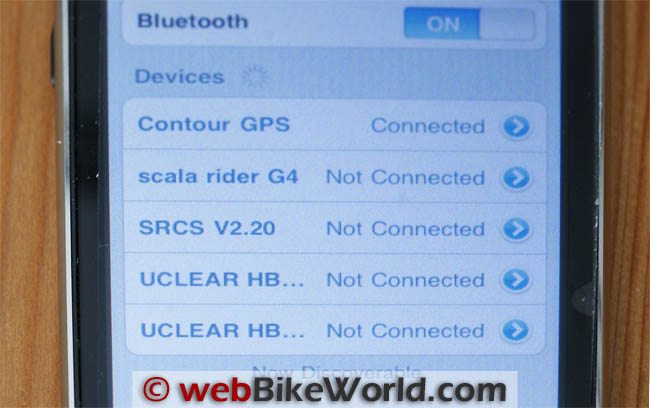
Firmware Version 1.12 – A Bit Shaky
The connection was stable for about five minutes then it dropped out as indicated by a status message on the iPod screen and double beeps from the camera.
Pushing the Bluetooth button once resulted in a single beep and the connection restored a few seconds later. But this was pretty much the one and only time restoral action or re-establishment of the link was successful.
I knew there were some issues with this initial release and the troubleshooting instructions were subsequently brought into play for troubleshooting, with mixed results.
At this point in time it was obvious that the feature worked, but some hardware and/or software tweaking seemed to be in order.
Regardless, the Mobile App is a feature that can add a whole new capability when used with a compatible mobile device, small or larger screen.
I sometimes got the live view feature to come up after completing one of the corrective warm start or cold start actions detailed in the instructions, but most of the time the whole system freezes up, necessitating a careful and time consuming removal and reinstallation of the battery as a last resort.
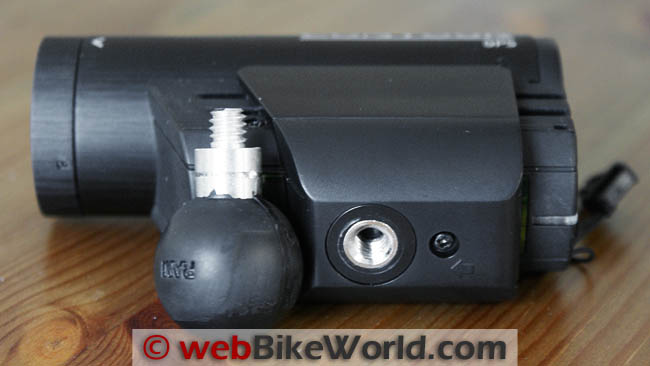
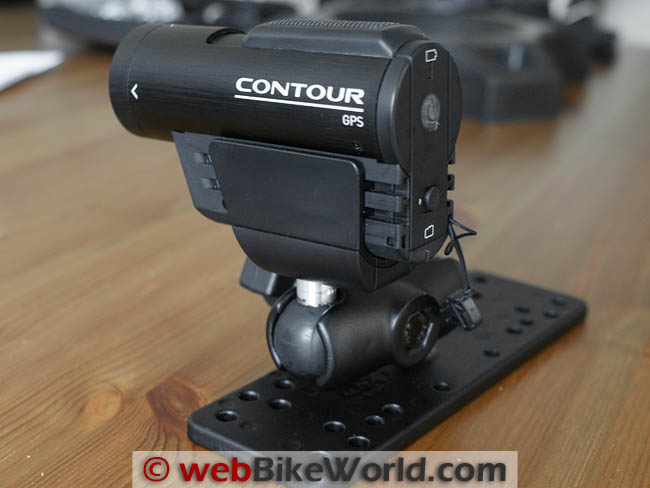
Where to Buy Contour GPS
Check Reviews & Prices on Amazon Check Reviews & Prices On RevZillaSee More: Motorcycle GPS, Motorcycle Intercom, Motorcycle Accessories
Firmware Version 1.13 – WooHoo!
What a difference a couple of weeks can make!
With an advisory email alerting me that firmware release 1.13 was available for downloading, it didn’t take me long to get it from the site and installed on the camera.
With this release, along with an update of the Storyteller application and a later-in-the-day update for the iPod, it all came together.
With the updates done, I didn’t even bother to delete and re-do the Bluetooth pairing on the iPod, but simply put the rebooted and powered up camera into its Bluetooth pairing mode, which resulted in a connection being made with the iPod.
Launching the Contour app brought about another five seconds of waiting, but it was worth it: what the camera was seeing was reflected on the iPod, with minimal delay and only a bit of buffering evident. No muss, no fuss, just consistent streaming.
Just remember though that this is a “preview” feature — once the “Record” button is activated (pushed forward), the Bluetooth streaming stops with the live view interrupted.
When recording is stopped, a single push of the “Hidden” or Bluetooth button reactivates the link in short order and streaming starts again.
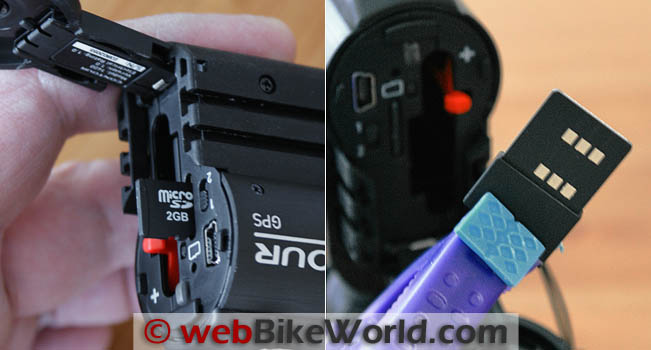
Some Observations
Positive tweaks are a wonderful thing and so far, it has been all positive. Bluetooth on the camera and iPod can be started at any time with a link made between the two devices in seconds.
Contour has and is working hard addressing known issues and the work is paying off. Firmware version 1.13 solved the connection issues I had with streaming and it is now rock solid between the two devices.
The latest firmware release, version 1.15, just installed, moved the stability yardstick along again.
But on a version 1.15 update note, I did have to delete the original pairing from the iPod and create a new Bluetooth pairing between the two devices, something not required after installing the earlier 1.13 release.
The Troubleshooting and Known Issues reference documents have not been needed since the update was done — this is good.
Another positive outcome from this synergistic pairing comes courtesy of the iOS Contour mobile app.
When launched, it automatically uses the Apple GPS Assist Now feature to provide position data to the devices, with minimal delay and far more speed than typically found with just GPS signal acquisition.
Without getting into the (many) ongoing pros and cons of this feature, which uses non-relational data from surrounding radio environment sources/users, it really does speed up the acquisition process for the Contour GPS.
Typical time to lock-on with the link activated is now seconds vice minutes.
Admittedly my acquisition times had already dropped significantly due to enhancements made in previous releases of the camera firmware.
Early days with the ContourGPS were absolute frustration in trying to get a GPS signal and positional data captured; continued technical support from Contour thankfully eased that pain.
Life with the Contour GPS is better — much better.
Between firmware updates and the “boost” from the GPS Assist Now, GPS acquisition and lock-on is quick and reliable. With the mobile app providing preview viewing, getting more out of the camera is easy.
Being able to configure the camera on the fly is no small thing either.
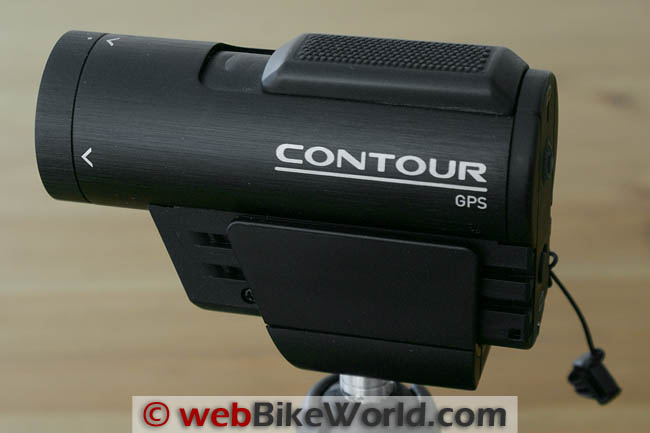
Conclusion
I waited for and purchased the Contour GPS to get its unique features (known and suspected) and despite some initial frustration I have no regrets.
Small, rugged and easy to use, video quality is hard to beat and thanks to the GPS capability I now have a permanent record of where the journey took me.
For reprising travel and routes, planning purposes and sharing, it is a hard to beat feature.
The Live View configuration works well — I suspect the Contour crew will continue to enhance the whole thing as well.
Being able to preview or view what the camera is seeing before recording, is very handy and far more accurate, and dynamic, than the short-range orientation beams.
I suspect that battery life has suffered a wee bit due to the GPS and Bluetooth features, but again, it is a trade-off willingly accepted and nothing that a second 3.7V, 1050mAh battery won’t cure.
But now, just when I was almost content, the Contour+ has been announced, with everything the Contour GPS provides, and more…does it ever end? I hope not!
More webBikeWorld:
▪ Video Action Camera Reviews
▪ Intercom and Radio Reviews
| wBW Review: Contour GPS HD Video Camera | |
|---|---|
| Manufacturer: Contour, Inc. | List Price: $349.99 USD. The Contour+ with GPS & Bluetooth is $499.99 USD. |
| Warranty: 180 days. | Made In: China |
| Review Date: June 2011 | |
Where to Buy Contour GPS
Check Reviews & Prices on Amazon Check Reviews & Prices On RevZillaSee More: Motorcycle GPS, Motorcycle Intercom, Motorcycle Accessories
Owner Comments and Feedback
See details on submitting comments.
From “R.H.” (06/2011): “Very nice and thorough review. I would like to add my opinion about the Contour GPS. This is my second go at Contour.
My original camera, the ContourHD 1080p, performed excellently and I had no issues with the design or device.
With the introduction of the GPS model I sold the camera and ordered the GPS.
My mistake. The GPS arrived in early November.
I had a tough time getting a GPS lock no matter how long the camera was turned on or how clear the sky was. After going through a couple of firmware updates, nothing helped.
The camera was replaced by Contour in early January.
My second camera worked well until the Connect View (Bluetooth) card was introduced along with the 1.12 firmware update). The camera experienced lockups when switching from the two position resolution switch (1 and 2 on the back of the camera).
1.13 was supposed to fix this bug but didn’t. 1.13 was also supposed to help with this and Bluetooth stability issues. It did neither.
1.15 came out and the problems only have gotten worse.
Ever since 1.12 I have felt the image quality has gotten worse. 1.15 is probably the worst that I have seen the GPS w/ regards to image quality.
Bluetooth has stopped working period and the device is very familiar with lockups that cause the lasers to stay on. The remedy is to take the battery out, wait a few seconds, and replace.
Speaking of the battery, the poor design of the battery hook causes the hook to catch on the battery label making it very difficult to take out so I have resulted to using a tape pull-tab affixed to the battery.
Sadly I am not the only person with these problems which is very evident on the Contour community boards.
I’m glad the author has had such great luck with Contour but my experience has proven otherwise.
The countless hours testing 1.16 beta firmware over the past month have been full of hope but there comes a time when there is just too much time, money, and energy and hasn’t lived up to expectations.
If you are absolutely dead set on purchasing a Contour it should be the ContourHD or the Contour+. The quality of video from the + vs the GPS is very noticeable and well worth the $120 extra over the GPS and Connect View addition.
There is at least one YouTube video demonstrating the video quality difference.
I plan on selling the camera and accessories once a reliable firmware is available and try to reclaim some of the $600+ spent on the camera and accessories.”
UPDATE From “R.H.” (06/2011): “I just wanted to give a quick follow-up on the Contour GPS.
They released firmware 1.16 yesterday and I did get a chance to test it out. Bluetooth works AND picture quality is looking a lot better than earlier versions.
They have apparently spent a lot of man hours trying to work out the bugs and from what I can tell, they have done it.
I still want to play with tweaking the settings but the defaults look great compared to other firmware releases.”

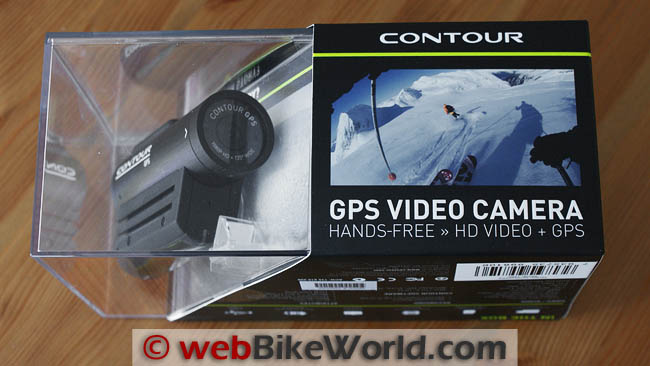


No Comment